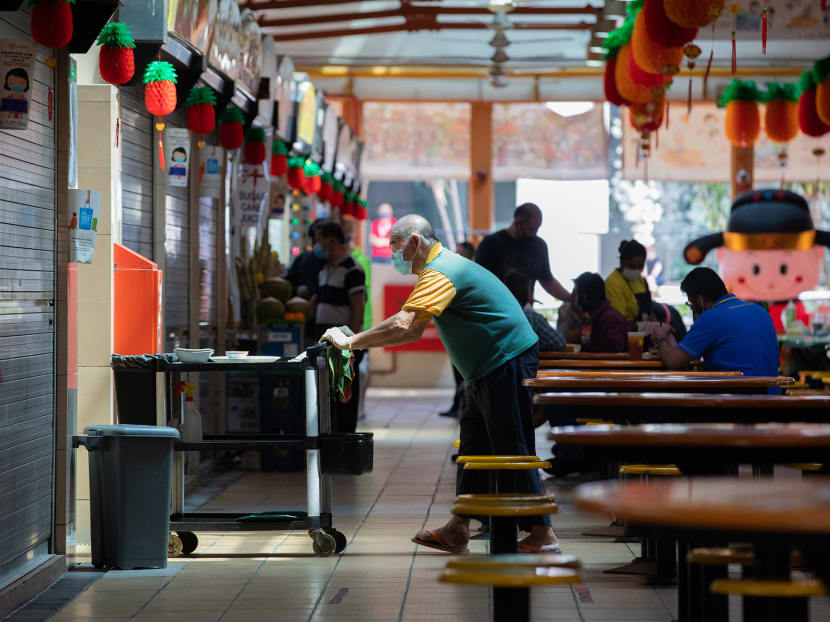National Wages Council urges employers to give workers one-off payment to help with higher cost of living
SINGAPORE — Employers should think about helping their staff with rising costs beyond support from the government, the National Wages Council (NWC) said on Tuesday (Oct 31).

SINGAPORE — Employers should think about helping their staff with rising costs beyond support from the government, the National Wages Council (NWC) said on Tuesday (Oct 31).
“To further help our employees cope, employers should consider giving a one-off special lump sum payment to employees, with heavier weightage for lower to middle income employees,” the council said in its wage guidelines for December 2023 to November 2024.
The NWC, a body comprising employer, employee and government representatives, made a similar recommendation in 2008 and 2011 when inflation was high. For unionised companies, this payment should be decided on through mutual agreement between the management and the union.
Mr Peter Seah, chairman of the National Wages Council, said a specific number or percentage can make it difficult to address the varying circumstances of employers.
"But the general call, I think, is a very positive call - to give a lump sum, particularly to the lower-wage and middle-wage people so that they can better navigate the inflationary pressures that they are now facing," he said.
INCREASES FOR LOWER-WAGE WORKERS
The NWC also said it recommended a 5.5 per cent to 7.5 per cent increase in gross monthly wages for lower-wage workers, or a pay bump of at least S$85 (US$62) to S$105, whichever is higher.
Employers who have done well and have positive business prospects should provide an increase at the upper bound of the range. Companies that have done well but face uncertain prospects should raise salaries by a percentage or amount in the lower to middle bound of the range.
Businesses that have not performed well should increase wages at the lower bound of the range.
“If business prospects subsequently improve, employers should consider further wage increases,” NWC said.
Lower-wage employees are those who earn a gross monthly wage of up to S$2,500. That corresponds approximately to the 20th percentile wage level of full-time employed residents.
More broadly, the NWC said wage growth should be in line with productivity growth, and employers should ensure that wages reflect increased productivity.
“The NWC encourages employers to reward employees with wage increases that are fair and sustainable,” it said.
The council added that wage structures need to be resilient and flexible in uncertain times, and companies should adopt the flexible wage system in which salaries have a sizeable variable component.
"The flexible wage system gives you the ability to adapt - to reward in good times and to be able to manage your costs in difficult times," said Mr Seah.
The Ministry of Manpower (MOM) said in a press release that the government accepts the wage guidelines being differentiated based on performance and outlook and supports the recommendation to consider a one-off lump sum payment to employees.
MOM said the government will continue to support employers through the five-year progressive wage credit scheme, which co-funds the salary increases of eligible lower-wage workers.
ADOPTION RATES, INDUSTRY RESPONSE
Mr Kenny Tan, deputy secretary for workforce at MOM, said 30 per cent of companies met or exceeded the recommendations to raise the salaries of lower-wage workers. The remaining 70 per cent of businesses may have increased salaries, but not as much as recommended.
He also said 89 per cent of resident employees had either the monthly variable component or the annual variable component as recommended under the flexible wage system. However, only 22 per cent of resident employees had both monthly variable components and annual variable components in their salaries in 2022.
"The government stands together with our tripartite partners to encourage employers to press on with business and workforce transformation," Mr Tan added.
Dr Robert Yap, president of the Singapore National Employers Federation, said the organisation strongly endorses the NWC's guidelines that recommended fair and sustainable wage increases.
He acknowledged that small and medium enterprises may find it more difficult to increase wages because of the uncertain economic outlook.
"My encouragement to SMEs is to really look at transforming to look at being more relevant because if you stay like that, without any transformation, in the long term, it is going to be harder and harder to be able to sustain," he said.
Ms Mary Liew, president of the National Trades Union Congress, said discussions were complex because some sectors like hospitality and aviation performed well, but economic uncertainty remains and higher costs are a concern for workers.
"We are pleased that the NWC has responded to this ground concerns of our workers by calling for a one-off lump sum payment to employees to help address the cost of living pressure that we are facing," she said.
"We hope that this will also help the middle income and the sandwiched class of our workers as well," Ms Liew said.
RECOMMENDED WAGES FOR ADMINISTRATORS, DRIVERS
The NWC also gave wage requirement recommendations for resident administrators and drivers under the occupational progressive wages model.
It first took effect this year with wage recommendations for March 2023 to February 2024. The new recommendations cover wage increases from July 2024 to June 2026.
The baseline gross wage for administrative assistants will see a one-off adjustment to at least S$1,800 from July 2024 from S$1,500 in March this year. This is to account for the fact that actual market wages increased since the 2023 requirement was announced in 2021.
The increases for administrative executives and administrative supervisors are smaller. The occupational progressive wage requirements will apply to around 48,600 resident lower-wage workers. An estimated 43,500 were earning less than the 2024 requirement as of 2022.
For drivers, the wage requirements are at a level that is meant to support good wage growth while allowing variable components to be retained “to mitigate (the) impact on firms’ operational and manpower planning”.
The requirements will apply to around 15,400 full-time resident lower-wage workers, and 8,400 were earning less than the 2024 requirement as of 2022. CNA
For more reports like this, visit cna.asia.



